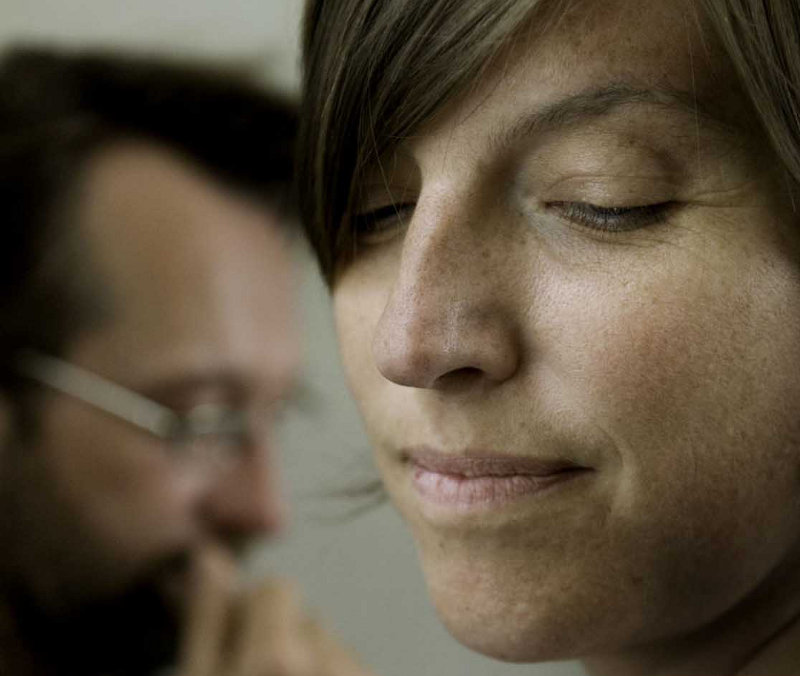The one strand of programming for children and young people in this year’s Manchester International Festival programme is a collection of four new works for different age groups from Belgian cross-disciplinary (dance / theatre / performance art) director Inne Goris. Goris’ work is experimental in form, always with a strong musical presence (from composer collaborator Dominique Pauwels). The programme revives her earliest show, the adaptation of the much loved children’s book ZigZag ZigZag, which toured to primary schools around Manchester, as well as the sound installation Daydream, presented for audiences 3+ in a container outside Manchester Town Hall. Also included were the hard-hitting child soldier themed installation Long Grass and the premiere of a new creation, Once Upon a Story.
I saw the latter two of these four shows, and struggled with both in different ways. Once Upon a Time is framed as a mash-up of fairy stories for audiences aged 3+, which sounds engaging enough, but in reality there simply weren’t enough toe-holds for any young audience member to gain purchase on the material. Performed near wordlessly by dancer Lisa Gunstone, the fragmented fairytale tropes – the ever dancing red shoes, the wolf in the forest, something obscure about farmyard animals – remained too abstract to draw us in. The intellectual exercise of ‘spotting the story’ is of limited interest to youngsters when we don’t have enough of a sense of character or story to care about the image and movement sequences presented, even when they are beautifully lit (by designer Johan Vandenborn). The staging too was underwhelming – a series of IKEA inspired yellow blocks ferried about the stage that never offered any real surprises (no, propping them up to overlap one another to create a three-inch-high slanting platform doesn’t create an exciting landscape). According to the programme notes, the piece was inspired by the ways children play, but the overall effect felt far too quiet and understated, broken up by unjustifiably long scene changes that felt alienating. Although there were flashes of interest, such as the presentation of the wicked witch complete with curling gaffer nails, the show felt underdeveloped and unpowered: an adult idea of what’s interesting about childhood with nowhere near enough understanding of what its young audience actually needed (including the appalling policy not to allow anyone who had to exit for a toilet break back into the theatre).
For audiences 15+, installation piece Long Grass explores the inner experiences of child soldiers. We are invited to sit in a grid of stools, with screens and speakers on four sides. Here, Pauwels has created a choral score of child voices which is initially electric and really speaks to the gothic vaults of the chapel-like interior of the Town Hall room in which the piece is presented. But as the video kicks in and we’re presented with protracted sequences of children violently fighting with one another, of children seemingly being gassed, and of a young boy painstakingly dragging his mother’s body around their family home (all created by what is described as a collaboration with ‘a group of young people’), the presentation manages to feel crass and overstated. The whispered monologue text creates a terribly sententious tone and relentlessly rakes over every generalisation about child soldier experiences – about brutalisation, sadism and suffering. The monstrously complex set, with electric screens that rise to separate audience members, felt like an expensive overstatement – the same point could easily have been made by simply using lights and had already been repetitively iterated in the text. The piece merges the experiences presented: costume and pop in the films suggest a range of different time scales (the mum’s bod is costumed 1940s style and bathed in an ancient looking bath, but the house has plastic laundry bags and the children’s dress is contemporary styled). Aestheticising this material feels unjustified and uncomfortable: by making it non specific – cutting its connections to time or place – the material simply felt like voyeurism, and I couldn’t make out its purpose. Without any political context the piece only seems to reflect that being a child soldier must be pretty awful, but who didn’t think that already before entering the show? I would be the last person to insist that work for young people must have a moral or point to make, but I do feel that making use of material such as this to no identifiable purpose feels highly problematic, for both audiences and those whose stories are represented.
MIF has not in the past developed a major strand of work for younger audiences, and it seems clear that much more thought needs to be taken on exactly what it hopes to offer them if such an audience can be developed in future.
For more from Manchester International Festival see Total Theatre’s reviews of Tino Sehgal’s installation work This Variation, Maxine Peake / Sarah Frankcom’s Shelleyan poetry protest The Masque of Anarchy, and Robert Del Naja and Adam Curtis’ sweeping, potentially radical Massive Attack v Adam Curtis.


